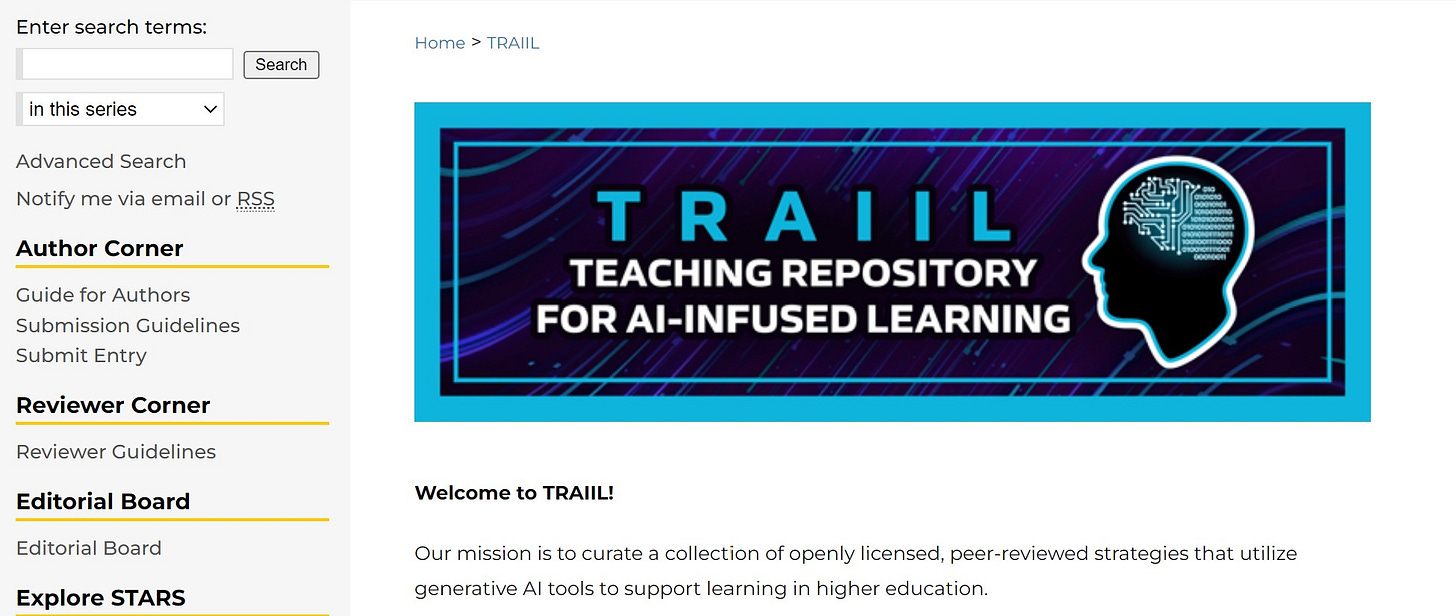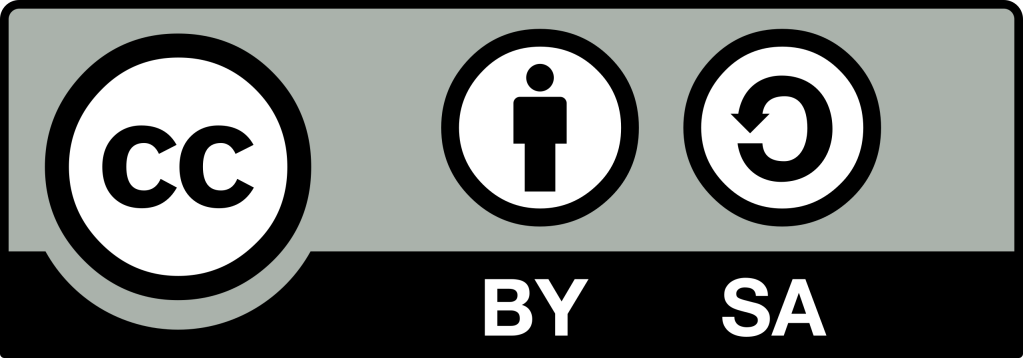Exploring the TRAIIL with Kevin Corcoran
A new repository for AI ideas for teaching and learning
Recently, I was invited to join the editorial board of TRAIIL, the Teaching Repository for AI-Infused Learning from the University of Central Florida.
With a mission to "a collection of openly licensed, peer-reviewed strategies that utilize generative AI tools to support learning in higher education," I thought it strongly aligned with my own interests of finding practical ways to support faculty by creating and providing open-access content that can be adapted by others as we continue to figure out all of this.
I also wanted to highlight that their call for submissions is still going strong until September 23--so if you have something to submit, please check out the guidelines and submit the cool work that you’re doing.
And, of course, if you're excited about the idea of such a resource, you can also join the mailing list or even become a peer reviewer!
I reached out to Kevin Corcoran to talk with him about the genesis of TRAIIL and his thoughts on leading the launch of this project
Lance Eaton: Where did the idea of TRAILL come from?
Kevin Corcoran: It's twofold. We had the opportunity to have Kyle Jensen, who's a faculty member from Arizona, State come out and speak with us a few times. In a side conversation with him, I said, “Hey, you've put your time and effort to travel to Orlando. What can we do to help you?” And his comment was essentially to pay it forward. That sort of spurred this.
I asked, “Okay, how do we help?” And he pointed to our infrastructure (our Digital Commons space, S.T.A.R.S.: Showcase of Text, Archives, Research & Scholarship).
At the same time I was toying around with that, Richard Hofler, a faculty member in our College of Business had asked our Center for Teaching, “Hey, is there any place I can go to see what other people doing about GenAI in their classroom?” And it just seemed that the two groups that were part of those conversations converged. We have a repository called T.O.P.R.: Teaching Online Pedagogical Repository. It is essentially a repository that was reviewed specifically for best practice for blended and online teaching. So we already had an infrastructure and a peer review process in place.
We pulled those folks together and said, “Can we use the structure that's here but make it focused on infused lessons?” We knew that we had our 2024 Teaching & Learning with AI Conference the week of July 24th (BTW 2025’s conference details are already up). So we set that as a target date to do some type of unveiling.
In doing so, I gave my folks less than 70 days to get this initiative together, and dang they did it! It was supposed to be just a splash page saying “Coming Soon” but the repository was up and ready.
Lance Eaton: So in that 70-day sprint, what was that process? What were the hiccups, the hurdles, or the breakthrough moments?
Kevin Corcoran: A key piece was having much of the team that had put the Digital Commons together along with TOPR available and willing to be part of this. Aimee deNoyelles, a Senior Instructional Designer at UCF, had been instrumental to TOPR’s structure and guidelines and was a critical contributor to TRAIIL. Also looking at this as an opportunity of what we put together for TOPR years ago, what worked, what was burdensome, and what would we use this opportunity to revise. So there was an opportunity to take a lot of the existing infrastructure and tweak it to make it a little bit more efficient.
Operationally, Digital Commons was already being supported by the library. Page Curry, Lee Dotson, Lily Dubach, and Sarah Norris from the library were key contributors who were also part of the TRAIIL team. We already had an infrastructure in documentation and workflows put together from TOPR that was collecting submissions globally. It was really tweaking just tweaking that system.
The one area that we had to wrestle with a little bit was around IP and copyright. So everything that goes into the repository is required to be openly licensed so it allows for reuse. But we also understand that the nature of generative AI and copyright is somewhat fluid. We were fortunate to have Sarah Norrs, our Scholarly Communication Librarian who specializes in copyright along with our legal counsel to get to some language that we were all comfortable with knowing that it was a point in time. That was probably the biggest challenge. We were narrowing down that last mile around language.
Lance Eaton: Can you share a little bit about the unveiling and how that went?
Kevin Corcoran: Yes. During the opening remarks of the conference, Wendy Howard, the director of our Pegasus Innovation Lab, revealed the repository as one of the slides. There was so much great content being introduced during that opening keynote that, it might not have gotten as much attention. Still, we had a follow-up session right after that was standing-room only.
Since then, we've had a lot of folks reach out and say, How can I be part of this? We've been selective about our editorial board but we're seeking or accepting applications for peer reviewers. So it's been good. We've also had some folks that are looking into similar repositories for their state and they're pausing to see how far we go and how we progress and whether or not they should just redirect their efforts to us.
We've already had that conversation too about, doing some cross-promotion or maybe having a page that links to other ones that may have a distinct flavor focus area. But right now we're focused on getting ours fully functional.
Lance Eaton: How do you see three to five years for now? What would be your vision of success?
Kevin Corcoran: This may sound a little bit grandiose but I would love for folks to see TRAIIL as the equivalent of OER Commons.
“Hey I need an AI lesson plan, I'm going to TRAIIL first and foremost, and then following, the path from there.” Understanding that AI and generative AI are constantly evolving, I see that there's going to be a constant flow of new items or iterative submissions. I think this will be a living, breathing entity for at least the first five years. I don't see a saturation point for quite some time.
I haven't discussed this with the full team yet, but I would love to see a case study component that goes with this repository at some point in time. It’d be great to find out from users: “Ok, you've taken this asset. You've either adopted it or you've adapted it. What kind of impact you had?” It's not dissimilar to the OER model. Originally, it was so focused on cost savings that we didn't think about the data elements around student success. And so, now we're doing this with that in mind. We can document student engagement or student success metrics as part of these, AI-infused lesson plans.
I hope that this repository is an opportunity to show skeptics or folks who are not sure that there are people who are successfully using generative AI. Additionally, there are positive student outcomes related to this usage. So it's a little less scary if you can start seeing. lesson plans, related to AI in your discipline.
Lance Eaton: The connection with OER is interesting. We know that there may be some shelf-life to the content of OER, but we also see a shelf-life to the AI activities in terms of what could be done in Spring 2023 and today. For instance, I used to have students copy and paste their questions and answers when using GenAI into a Google Doc, but now, they can just share the chatlog itself. I’m curious, has there been any conversation about the moving target of the technology itself?
Kevin Corcoran: There has been, but I don't think that we've come to a definitive answer on how we're going to do that. I think it's a question that we can answer in two-to-three years. Or perhaps sooner because of the way AI is rapidly evolving. But to your point, there are AI tools that were introduced six months ago and are gone because they've been bought by or made redundant by Gemini or Co-Pilot who incorporated those tools inside.
Lance Eaton: So if folks want to know more, get involved, or have questions, what should they do?
Kevin Corcoran: We have a sign-up sheet for updates. We’re looking for Peer Reviewers. And, of course, consider submitting your strategy by September 23! If folks are thinking about doing something similar, we'd love to partner instead of duplicating efforts. Feel free to reach out to us at TRAIIL@ucf.edu.
AI+Edu=Simplified by Lance Eaton is licensed under Attribution-ShareAlike 4.0 International



